Kathy Acker
Kathy Acker
And more

All Us Girls Have Been Dead for So Long
Kathy Acker’s final published text, Eurydice in the Underworld, harnesses the Greek mythology of the heroic trip to hell; refocusing the story’s centre away from the male hero and onto the dead girl, who has been murdered by a snake.
Katabasis refers both to a journey into the underworld, and a trip to the coast. In times of climate crisis, hell – the realm of the dead, the scorching, the boiling, the rotting – is also situated at the sea, as waters heat, melt and rise.
First performed in 2019 at the ICA, London, All Us Girls Have Been Dead for So Long was a low-fi musical extravaganza flowing between beach and underworld, animating the animal, alien, and abject actors in our current climate apocalypse – most notably Ecco the Dolphin, who has lost their pod and must (like Eurydice, Orpheus and so on) travel deep beneath both time and space to rescue their missing and possibly dead kin.
Only a fool will now attempt to stop us girls. To halt our ecstatic singing.
A play in three acts by Linda Stupart and Carl Gent with a foreword by Isabel Waidner.
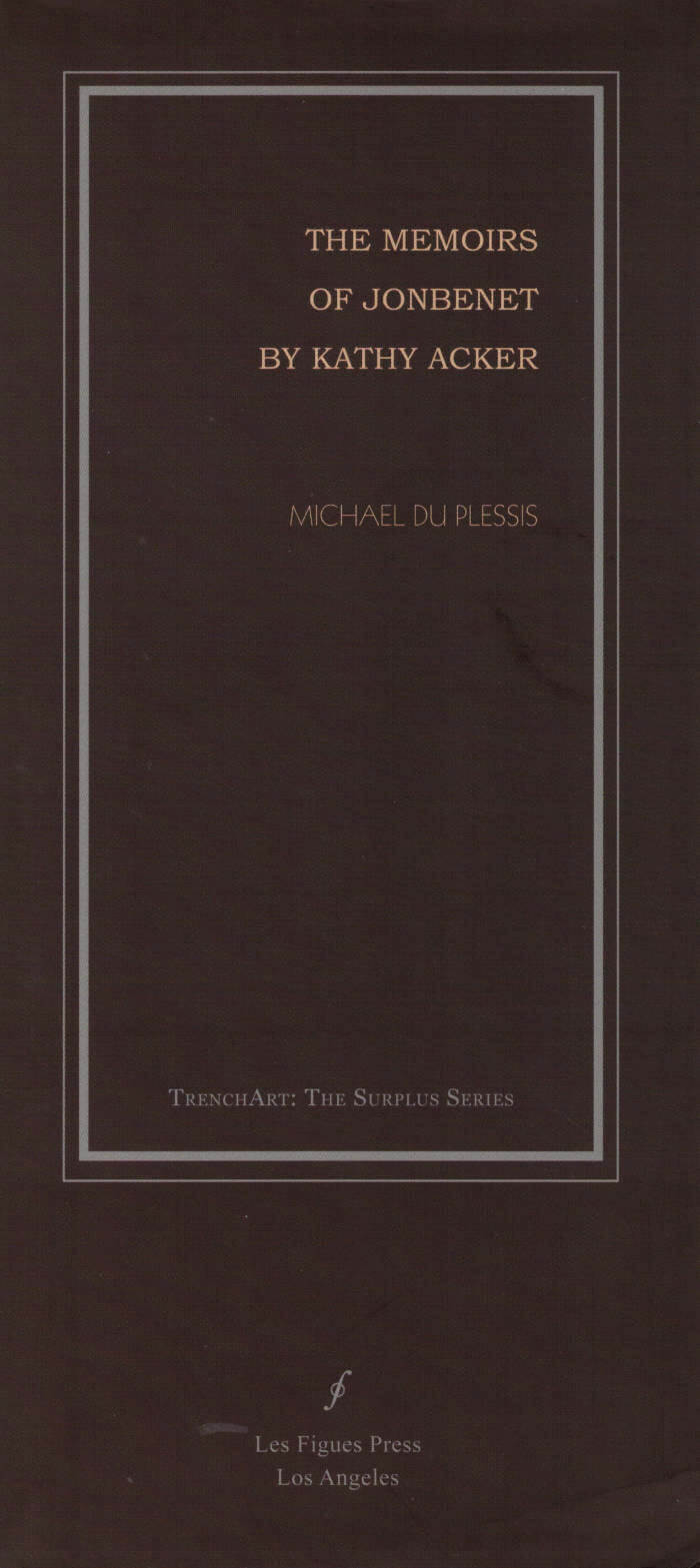
The Memoirs of JonBenet by Kathy Acker
JonBenet meets Kathy Acker in a rollicking coming-of-age tale set in the snow globe of Boulder, Colorado. With guest appearances by Little Lord Fauntleroy, H. P. Lovecraft, the Blue Fairy, a wind-up Walter Benjamin, a soft-toy Cthulhu, O (from Story of O), and many more. Neither tribute nor pastiche, The Memoirs of JonBenet by Kathy Acker investigates the "self" of very-late-capitalism in a collage of all that is right, and terribly wrong, in America.
The Memoirs of JonBenet by Kathy Acker is published as part of the TrenchArt: Surplus Series, with an introduction by Peggy Kamuf and visual art by Klaus Killisch.
Michael du Plessis teaches Comparative Literature and English at the University of Southern California, where he is also completing a masters degree in Professional Writing. Du Plessis has written about a wide variety of subjects, from Goth culture to the French fin-de-siècle. He has also performed at Highways and at the MAK Center/Schindler House, amongst other venues.
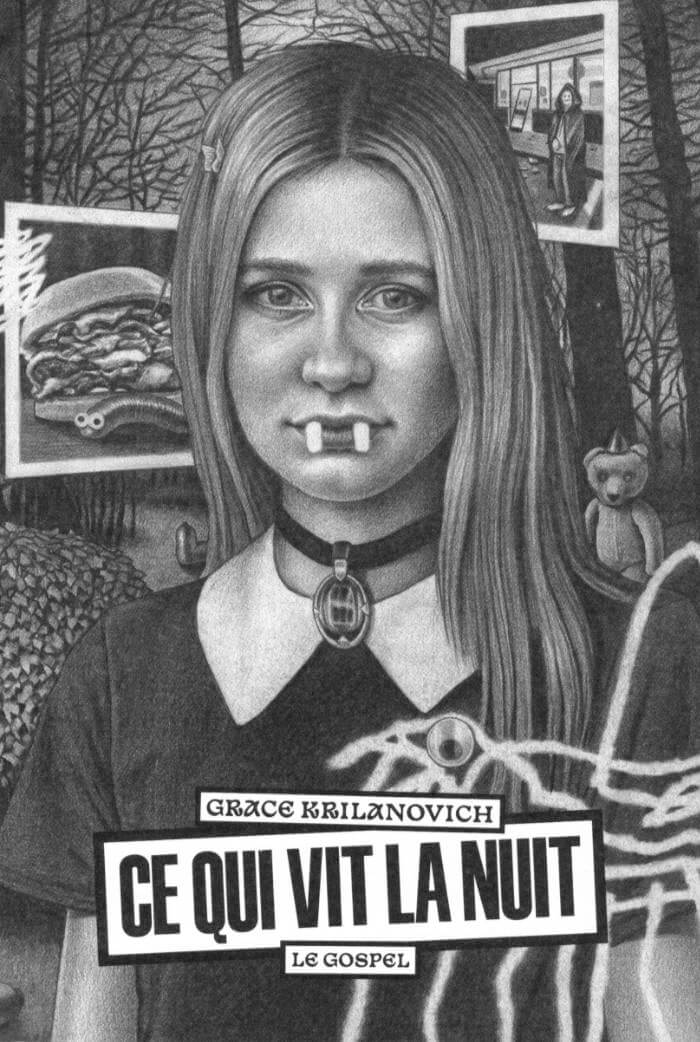
Ce Qui Vit La Nuit
“Je voyais ce qui était écrit sur les murs. Ce n’était plus les années 1990. Ce n’était même plus le Pacifique Nord-Ouest. Quelque chose était arrivé qui avait tout balayé et j’avais été abandonnée enfermée dans un sarcophage puant, rêvant de l’endroit où j’étais née, me sentant très triste parce que cet endroit aussi avait été ramassé et fourré dans la gueule du monde.”
Elle a 17 ans, sort à peine de l’adolescence et pourtant elle est déjà en rupture totale avec le monde qui l’entoure et la violente. Fuyant sa famille d’accueil, elle part à la recherche de Kim, une sœur adoptive adorée qui a pris la route un peu avant elle. En chemin, elle tombe sur une bande d’enfants perdus, junkies violents devenus vampires qui dérivent de concerts en hold-ups, de parkings de supermarchés en gares routières. Sur les routes crasseuses de l’Oregon, cette riot grrrl d’un genre un peu particulier commence à entendre une voix, celle d’une pionnière morte de froid des siècles auparavant, qui se mêlent à celles de toutes les laissées-pour-compte de la société américaine.
Texte culte de la contre-culture aux USA, publié en 2010 et immédiatement salué comme un choc, le premier roman de Grace Krilanovich n’est pas un récit traditionnel. Héritière de William S. Burroughs, Kathy Acker, Stephen King et David Lynch, elle explose les carcans de la narration et offre une œuvre à la lisière de la littérature gothique et du roman d’horreur, invitant à une plongée rare dans le milieu punk hardcore américain des années 1990.
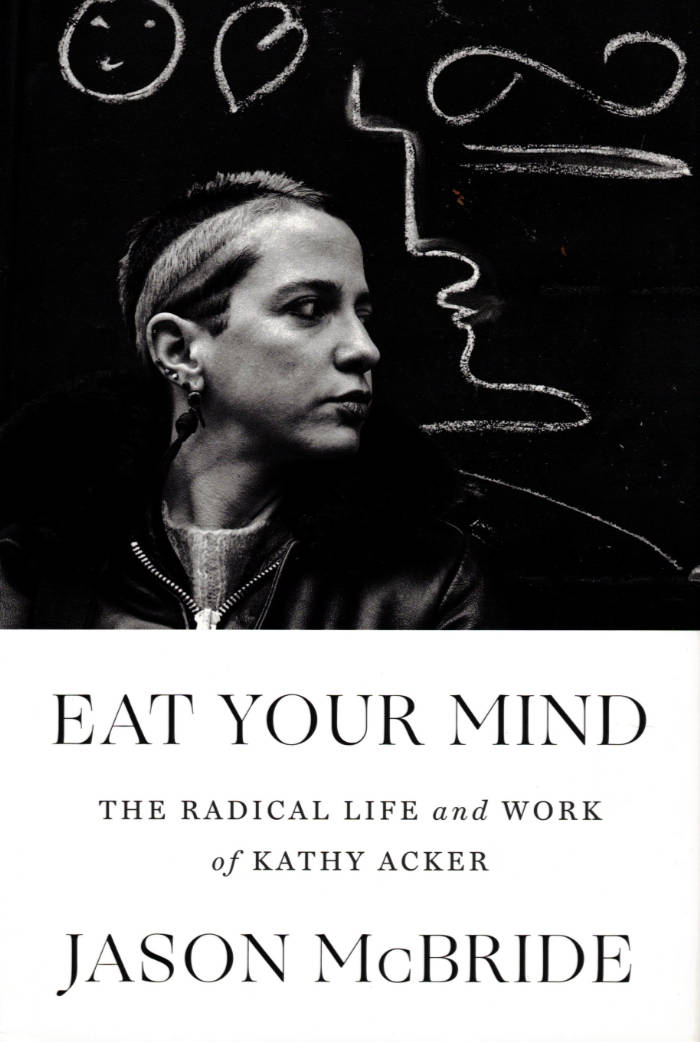
Eat Your Mind: The Radical Life and Work of Kathy Acker
The first full-scale authorized biography of the pioneering experimental novelist Kathy Acker, one of the most original and controversial figures in 20th-century American literature.
Kathy Acker (1947-1997) was a rare and almost inconceivable thing: a celebrity experimental writer. Twenty-five years after her death, she remains one of the most original, shocking, and controversial artists of her era. The author of visionary, transgressive novels like Blood and Guts in High School; Empire of the Senses; and Pussy, King of Pirates, Acker wrote obsessively about the treachery of love, the limitations of language, and the possibility of revolution. She was notorious for her methods-collaging together texts stolen from other writers with her own diaries, sexual fantasies, and blunt political critiques-as well as her appearance. With her punkish hairstyles, tattoos, and couture outfits she looked like no other writer before or after. Her work was exceptionally prescient, taking up complicated conversations about gender, sex, capitalism, and colonialism that continue today.
Acker's life was as unruly and radical as her writing. Raised in a privileged but oppressive Upper East Side Jewish family, she turned her back on that world as soon as she could, seeking a life of romantic and intellectual adventure that led her to, and through, many of the most thrilling avant-garde and countercultural moments in America: the births of conceptual art and experimental music; the poetry wars of the 60s and 70s; the mainstreaming of hardcore porn; No Wave cinema and New Narrative writing; Riot grrls, biker chicks, cyberpunks. As this definitive biography shows, Acker was not just a singular writer, she was also a titanic cultural force who tied together disparate movements in literature, art, music, theatre, and film.
A feat of literary biography, Eat Your Mind is the first full-scale, authorized life of Acker. Drawing on exclusive interviews with hundreds of Acker's intimates as well as her private journals, correspondence, and early drafts of her work, acclaimed journalist and critic Jason McBride offers a thrilling account and a long overdue reassessment of a misunderstood genius and revolutionary artist.

Queer Experimental Literature: The Affective Politics of Bad Reading
This volume argues that postwar writers queer the affective relations of reading through experiments with literary form. Tyler Bradway conceptualizes "bad reading" as an affective politics that stimulates queer relations of erotic and political belonging in the event of reading. These incipiently social relations press back against legal, economic, and discursive forces that reduce queerness into a mode of individuality.
Each chapter traces the affective politics of bad reading against moments when queer relationality is prohibited, obstructed, or destroyed—from the pre-Stonewall literary obscenity debates, through the AIDS crisis, to the emergence of neoliberal homonormativity and the gentrification of the queer avant-garde. Bradway contests the common narrative that experimental writing is too formalist to engender a mode of social imagination. Instead, he illuminates how queer experimental literature uses form to redraw the affective and social relations that structure the heteronormative public sphere.
Through close readings informed by affect theory, Queer Experimental Literature offers new perspectives on writers such as William S. Burroughs, Samuel R. Delany, Kathy Acker, Jeanette Winterson, Eve Kosofsky Sedgwick, Alison Bechdel, and Chuck Palahniuk.
Queer Experimental Literature ultimately reveals that the recent turn to affective reading in literary studies is underwritten by a para-academic history of bad reading that offers new idioms for understanding the affective agencies of queer aesthetics.

Tripticks
First published in 1972, Ann Quin's fourth and final novel was a radical break from the introspective style she had developed in Three and Passages: a declaration of independence from all expectations.
Brashly experimental, ribald, and hilarious, Tripticks maps new territories for the novel—aspiring to a form of pop art via the drawings of the artist Carol Annand and anticipating the genre-busting work of Kathy Acker through collage and gory satire.
Splattering its pages with the story of a man being chased across a nightmarish America by his "first X-wife," and her "schoolboy gigolo," Tripticks was ground zero for the collision of punk energy with high style.

Worms #5 'Impurity'
In this issue, Worms explores New Narrative alongside writers working today that incorporate some of it’s themes. The cover star Saidiya Hartman talks with Rhea Dillon about the limits and processes of creating stories from the archive, while Camille Roy and Dodie Bellamy give insight into New Narrative from their experiences involved in the movement. Savannah Knoop tells about their life playing the character of J.T Leroy, while Calla Henkel delves into ideas of using other people’s narratives as our own. There’s lots of gleaning, lots of stealing and lots of hard truths coming from the human body. There is poetry and fiction and all of the usual bits, as well as an experimental cut up piece demonstrating the appropriation method that Kathy Acker (via William Burroughs) used in so much of her work. Many more worms to be found in these pages.
Featuring:
Saidiya Hartman, Camille Roy, Dodie Bellamy, Lynne Tillman, Estelle Hoy, Rhea Dillon, Savannah Knoop, Lauren Fournier, Madelyne Beckles, Joanna Walsh, Anne Turyn, Cristina Morales, Calla Henkel, Jenny Zhang
Contributors:
Zara Joan Miller, Haydee Touitou, Nicole Della Costa, Cecilia Pavón, Valentina Von Klencke, Feyi Adegbite, Alice Platti, Victoria Campa, Alice Butler, Clemmie Bache, Caitlin Mcloughlin, Jack Stuart Mills, Honor Weatherall, Arcadia Molinas, Aimee Ballinger, Wes Knowler, Eleanor Wang, Katy Dadacz, Olive Couri, Rachel Cattle, Isabelle Bucklow, Sarah Bodri, Hope Roafl, Maura Sappilo, Jodie Hill, Jacqueline Ennis Cole, Mary Watt, Delia Rainey.

I'll Drown My Book: Conceptual Writing by Women
Vanessa Place, Teresa Carmody and 2 more
Conceptual writing is emerging as a vital 21st century literary movement and I’ll Drown My Book represents the contributions of women in this defining moment. Edited by Caroline Bergvall, Laynie Browne, Teresa Carmody and Vanessa Place, I’ll Drown My Book takes its name from a poem by Bernadette Mayer, appropriating Shakespeare. The book includes work by 64 women from 10 countries, with contributors’ responses to the question—What is conceptual writing?—appearing alongside their work. I’ll Drown My Book offers feminist perspectives within this literary phenomenon.
CONTRIBUTORS:
Kathy Acker, Oana Avasilichioaei & Erin Moure, Dodie Bellamy, Lee Ann Brown, Angela Carr, Monica de la Torre, Danielle Dutton, Renee Gladman, Jen Hofer, Bernadette Mayer, Sharon Mesmer, Laura Mullen, Harryette Mullen, Deborah Richards, Juliana Spahr, Cecilia Vicuña, Wendy Walker, Jen Bervin, Inger Christiansen, Marcella Durand, Katie Degentesh, Nada Gordon, Jennifer Karmin, Mette Moestrup, Yedda Morrison, Anne Portugal, Joan Retallack, Cia Rinne, Giovanni Singleton, Anne Tardos, Hannah Weiner, Christine Wertheim, Norma Cole, Debra Di Blasi, Stacy Doris & Lisa Robertson, Sarah Dowling, Bhanu Kapil, Rachel Levitsky, Laura Moriarty, Redell Olsen, Chus Pato, Julie Patton, Kristin Prevallet, a.rawlings, Ryoko Seikiguchi, Susan M. Schultz, Rosmarie Waldrop, Renee Angle, Rachel Blau DuPlessis, Theresa Hak Kyung Cha, Tina Darragh, Judith Goldman, Susan Howe, Maryrose Larkin, Tracie Morris, Sawako Nakayasu, M. NourbeSe Philip, Jena Osman, kathryn l. pringle, Frances Richard, Kim Rosenfeld, and Rachel Zolf.

Top Stories
Top Stories was a prose periodical published from 1978 to 1991 by the artist Anne Turyn in Buffalo, New York, and New York City. Over the course of twenty-nine issues, it served as a pivotal platform for experimental fiction and art through single-artist issues and two anthologies. The entire run of Top Stories is collected and reproduced here across two volumes.
Top Stories primarily featured female artists, though in Turyn’s words a few men “crept in as collaborators.” Although primarily “a prose periodical” (as its byline often stated), the issues varied in form and aesthetics, pushing the boundaries of what prose could be and, from time to time, escaping the genre altogether. In fact, the only parameters required for participants were that the periodical’s logo and issue list be included on the front and back covers, respectively.
A great deal of the works are short stories by the likes of Pati Hill, Tama Janowitz, and Kathy Acker, whose Pushcart Prize–winning “New York City in 1979” appeared for the first time in book form as part of the series. Constance DeJong contributes “I.T.I.L.O.E.,” a widely unavailable work that features the artist’s trademark prose and is sure to please fans of her novel, Modern Love. The largest issue of the periodical is undoubtedly Cookie Mueller’s “How to Get Rid of Pimples,” which consists of a series of character studies of friends interspersed with photographs by David Armstrong, Nan Goldin, and Peter Hujar altered with freshly drawn blemishes.
Top Stories also celebrates less conventional literary forms. Issues by Lisa Bloomfield, Linda Neaman, and Anne Turyn take the form of artists’ books, juxtaposing image and text to construct tightly wound, interdependent narratives. Jenny Holzer and Peter Nadin present a collaborative work in copper ink comprised of truisms by Holzer on corporeal and emotional states and drawings by Nadin of abstract bodies. Janet Stein contributes a comic, while Ursule Molinaro provides a thorough index of daily life (and the contempt it produces) consisting of entries that were written just prior to lighting a cigarette.
Top Stories remains vitally defiant, an essential witness to what was the downtown literary and art-world underground.
Primary contributors include Kathy Acker, Laurie Anderson, Sheila Ascher, Douglas Blau, Lisa Bloomfield, Linda L. Cathcart, Cheryl Clarke, Susan Daitch, Constance DeJong, Jane Dickson, Judith Doyle, Lee Eiferman, Robert Fiengo, Joe Gibbons, Pati Hill, Jenny Holzer, Gary Indiana, Tama Janowitz, Suzanne Johnson, Caryl Jones-Sylvester, Mary Kelly, Judy Linn, Micki McGee, Ursule Molinaro, Cookie Mueller, Peter Nadin, Linda Neaman, Glenn O’Brien, Romaine Perin, Richard Prince, Lou Robinson, Janet Stein, Dennis Straus, Sekou Sundiata, Leslie Thornton, Kirsten Thorup, Lynne Tillman, Anne Turyn, Gail Vachon, Brian Wallis, Jane Warrick, and Donna Wyszomierski.
David Armstrong, Nan Goldin, JT Hryvniak, Peter Hujar, Nancy Linn, Trish McAdams, Linda Neaman, Marcia Resnick, Michael Sticht, and Aja Thorup all make appearances as well, contributing artwork for the covers or as illustrations.
Anne Turyn (b. 1954) is a photographer based in New York. Turyn’s work has been exhibited at the Museum of Modern Art, the Metropolitan Museum of Art, Kunsthalle Bern, Denver Art Museum, Walker Art Center, and Los Angeles County Museum of Art.
Published by Primary Information, 954 pgs, 21.6 × 14 cm, 2 Paperback books in Slipcase, 2022
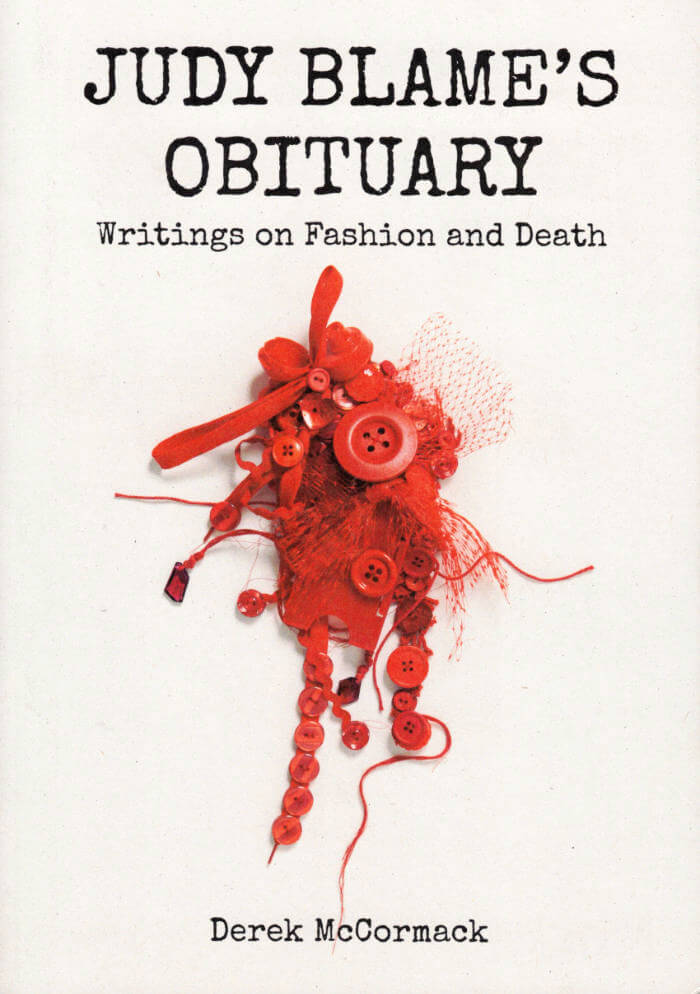
Judy Blame’s Obituary: Writings on Fashion and Death
Derek McCormack is the author of fashion-inflected novels that cast luminaries such as Elsa Schiaparelli and Balenciaga as characters. This collection brings together for the first time McCormack's fashion journalism. He writes about and interviews fashion figures that fascinate him, tracing the ways they inspire and inhabit his novels. The result is a sort of memoir in essays: as he writes, "My tribute to [Judy] Blame is about him and about me—there are lots of my own tales woven in with the topics I touch on. The writing here is a sort of autobiography, a life seen through a scrim, or a life as a scrim—my moire mémoire."
Judy Blame's Obituary contains twenty years' worth of reminiscences, reviews of fashion shows and books, interviews with writers about fashion, and interviews with fashion designers about writing. He talks to Nicolas Ghesquière about perfume, and to Edmund White about which perfume he wore as a young fag in New York City. He inspects the clothes that Kathy Acker left behind when she died, and he summons the spirit of Margiela in a literary seance. He traces the history of sequins, then recounts the cursed story of Vera West, the costume designer who dressed the Bride of Frankenstein. These pieces were all previously published, some in Artforum, some in The Believer, and some in underground publications like Werewolf Express—what binds them together is a sense that though fashion victimizes us, this victimization is sometimes a sort of salvation.
Derek McCormack is a Canadian writer. His most recent novels are The Well-Dressed Wound and Castle Faggot, both published by Semiotext(e). Of Castle Faggot, Dennis Cooper said: "It is really just one of the best books ever, and maybe the greatest novel ever written.
Praise for Judy Blame's Obituary:
'Derek McCormack, Canada's most famous author as yet unsullied by Nobel Prize or television adaptation, hides in plain sight as a fashion journalist. Parallel to his writing incantatory, scatalogical fiction, he has reviewed collections and interviewed the great and good of la mode. His divagations are often darkly hilarious and always exquisitely tailored. The sublime and the ridiculous coexist in his prose, as they do in life. Fashion victims, ignore his insights at your peril.' — William E. Jones
Published by Pilot Press, 20 × 15 cm, Softcover, 2021

The Well-Dressed Wound
A gleeful grotesquerie and savage satire, featuring Abraham and Mary Todd Lincoln and the Devil, along with Civil War dead, deconstructed couture, and gay ghosts.
The Well-Dressed Wound is Derek McCormack's play script "séance" a fashion show by the dead for the living. In the depths of the Civil War, in a theater in P. T. Barnum's American Museum on Broadway, Abraham and Mary Todd Lincoln participate in a staged spiritualistic rite. But the medium conducting them has invited along another being: the Devil, disguised as twentieth-century French fashionista Martin Margiela (aka "King Faggot"). What follows is the most fiendish runway show ever mounted, complete with war dead, deconstructed couture, and gay ghosts infected with all manner of infectious agents, including oozy AIDS.
While his previous fictions have explored the darker corners of country music, high fashion, and camp, The Well-Dressed Wound is McCormack's most radical work yet, occultishly evoking the evil-twin muses of transgressive literature, Kathy Acker and Pierre Guyotat. The creation thus conjured is a gleeful grotesquerie, a savage satire not so much of fashion as of death, a work that, as Bruce Hainley observes in Artforum, puts "the 'pus' back in opus." Here death and life spin on a viral double helix of contamination and couture, blistering and bandages, history and hysteria, semen and seams. "Being dead is so very now," Hainley opines. "This tiny tome (a time bomb, a tomb) is to die for and radically alive."
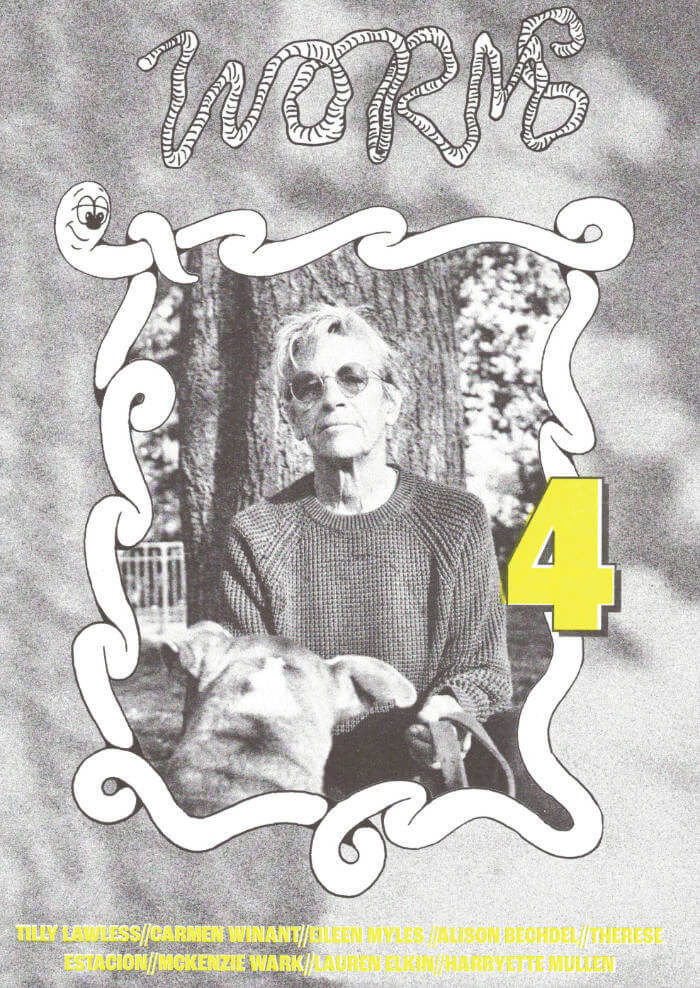
Worms #4 'The Flaneuse'
Worms #4 looks at psychogeography and the Situationists from a non-male perspective. Taking flâneuserie and the creative benefits of a good walk as its starting point, the issue features conversations with Eileen Myles, Alison Bechdel, Lauren Elkin, Tilly Lawless, Mckenzie Wark, Therese Estacion and Carmen Winant. 2021 was a fraught year for walking; the pandemic restricted our right to movement, while the murders of women walking in London led us to ask the question: how can the act of walking the streets spark political conversation?
Also included with this issue is an affirmation booklet in collaboration with @somuchluvindisclub
Worms is a biannual literary style magazine that celebrates female and non-binary writer culture.
‘If you’re reading this, you are a worm. We’re all worms, and in the end, we’re going to be eaten by them. As a (book)worm, you will fertilize your mind with glorious words…’
Founded in 2019 by Clem Macleod during her degree at Central Saint Martins, Worms began with a mad, spiralling obsession with the late Kathy Acker.
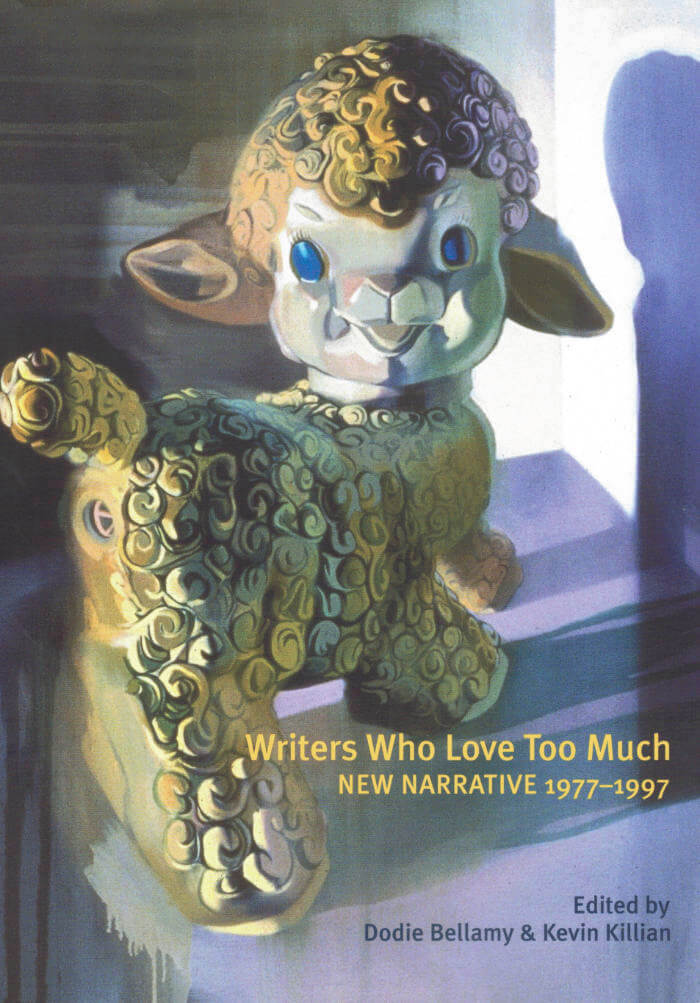
Writers Who Love Too Much: New Narrative 1977-1997
This long overdue anthology of New Narrative includes both classic New Narrative texts and rare supplementary materials, allowing the movement fueled by punk, pop, porn, French theory, and social struggle to bound back to life, ripe with dramatic propulsion, to form a new map of late 20th century creative rebellion.
"Gossipy and uninhibited, its breath is hot in your ear. It wants to tell you everything, and it wants you to overshare back." — M. Milks
"One of New Narrative's all-time best jokes is about the movement itself. It's the parodic motto that Bellamy formulates in Academonia for New Narrative "at its worst" "I have sex and I'm smarter than you." But "sex without fantasy," Camille Roy posits, "is nothing." The pieces compiled in Writers Who Love Too Much don't restrict fantasy. They use, as Boone says, eros, rather than facts, as the matter of narrative. Sex and fantasy are for New Narrative the stuff of ordinary life." — Jean-Thomas Trembla
Contributors include: Steve Abbott, Kathy Acker, Michael Amnasan, Roberto Bedoya, Dodie Bellamy, Bruce Benderson, Charles Bernstein, Nayland Blake, Bruce Boone, Lawrence Braithwaite, Rebecca Brown, Kathe Burkhart, Marsha Campbell, Dennis Cooper, Sam D'Allesandro, Gabrielle Daniels, Leslie Dick, Cecilia Dougherty, Bob Flanagan, Robert Glück, Judy Grahn, Brad Gooch, Carla Harryman, Richard Hawkins, Ishmael Houston-Jones, Gary Indiana, Edith A. Jenkins, Kevin Killian, Chris Kraus, R. Zamora Linmark, Eileen Myles, John Norton, F.S. Rosa, Camille Roy, Sarah Schulman, Gail Scott, David O. Steinberg, Lynne Tillman, Matias Viegener, Scott Watson, Laurie Weeks.
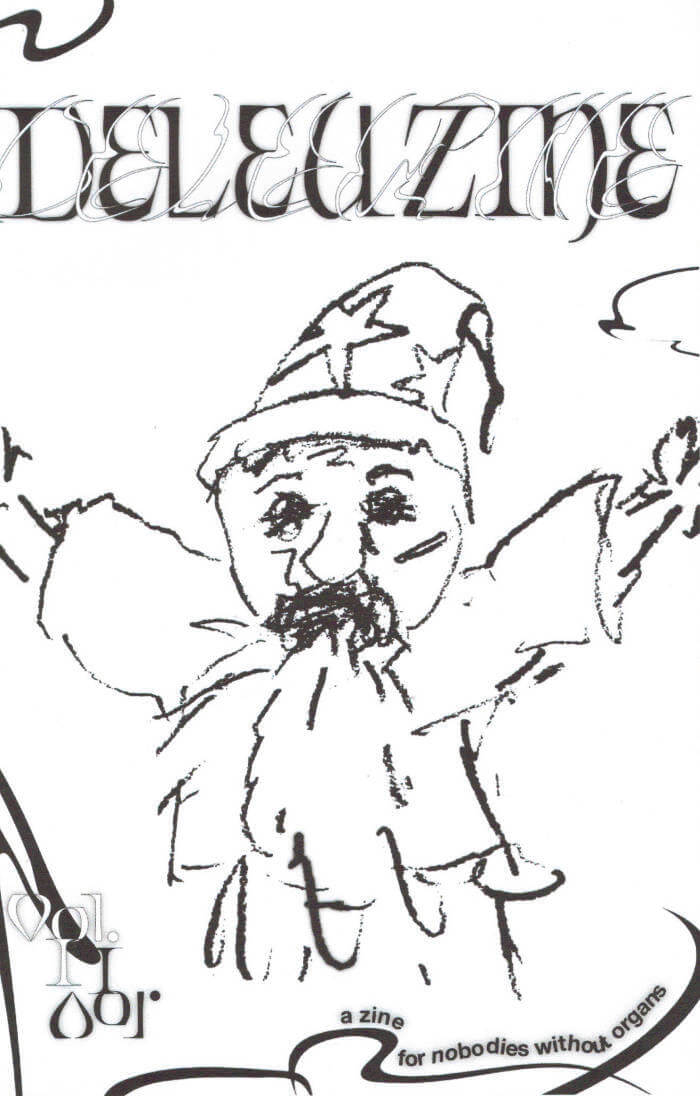
Deleuzine Vol. 1 - Sprouting In All Directions
Deleuzine: A Zine for Nobodies Without Organs is an experimental publication inspired by the writings of French philosopher Gilles Deleuze, as well as figures whose life or work can be said to exemplify aspects of Deleuze’s philosophy of life, including Antonin Artaud, Ezekiel Mphaphele’s Wanderers and Kathy Acker among others. Encompassing the fields of literature, philosophy, ethnography, archaeology, and the arts, the publication aims at a radical exploration (and exploitation) of word, image, and printed matter towards beauty, but also aesthetic and political freedom.
With contributions by: Egle Ambrasaite, Alex Aspden, Edoardo Biscossi, Sabeen Chaudhry, Ruby Conner, Genevieve Costello, Andrew Culp, Anna Luisa Di Lauro, Sophie Fitze, Roxman Gatt, Helena Grande, Rose Higham-Stainton, Sevana Holst, Patrick McAlindon, Geiste Kincinaityte, Michele Muraca, Holly Rowley, Katie Shannon, Natalie Stypa, Katarina Sylvan, Elaine Tam, Haydée Touitou, Samuel White, Romy Day Winkel.
Edited by: Lilly Marks, Sabeen Chaudhry and Holly Rowley.
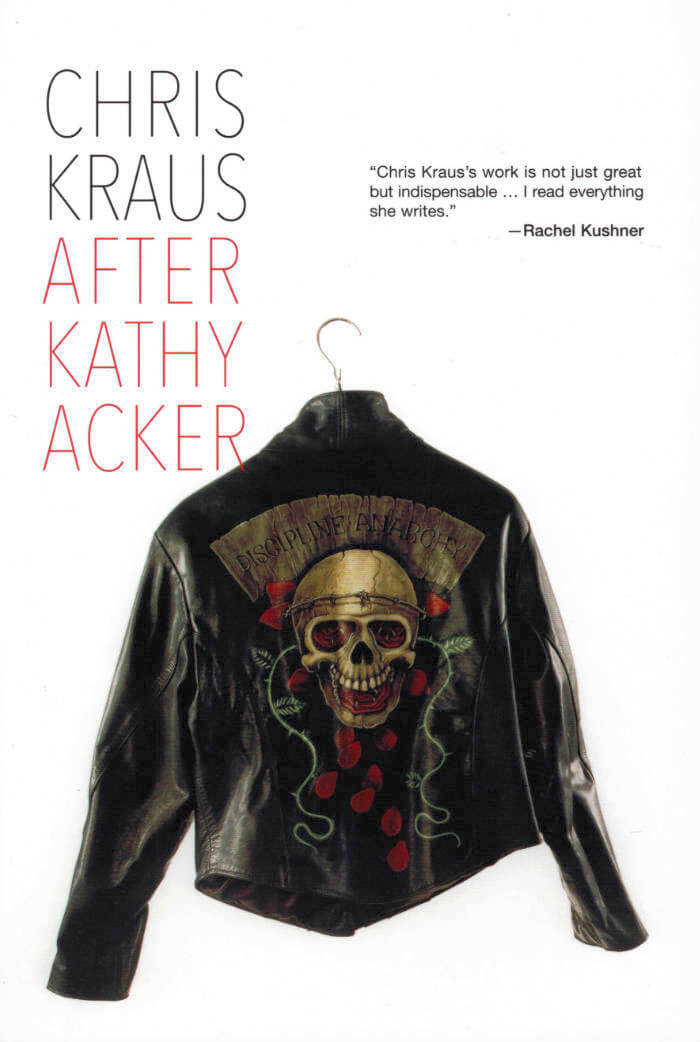
After Kathy Acker
The first authorized biography of postmodernism's literary hero, Kathy Acker.
Acker's life was a fable; and to describe the confusion and love and conflicting agendas behind these memorials would be to sketch an apocryphal allegory of an artistic life in the late twentieth century. It is girls from which stories begin, she wrote in her last notebook. And like other lives, but unlike most fables, it was created through means both within and beyond her control.—from After Kathy Acker
Rich girl, street punk, lost girl and icon… scholar, stripper, victim, and media-whore: The late Kathy Acker's legend and writings are wrapped in mythologies, created mostly by Acker herself. Twenty years after her death, Acker's legend has faded, making her writing more legible.In this first, fully authorized, biography, Chris Kraus approaches Acker both as a writer and as a member of the artistic communities from which she emerged. At once forensic and intimate, After Kathy Acker traces the extreme discipline and literary strategies Acker used to develop her work, and the contradictions she longed to embody. Using exhaustive archival research and ongoing conversations with mutual colleagues and friends, Kraus charts Acker's movement through some of the late twentieth century's most significant artistic enterprises.

Philosophy for Spiders: On the Low Theory of Kathy Acker
McKenzie Wark combines an autobiographical account of her relationship with Kathy Acker with her transgender reading of Acker's writing to outline Acker's philosophy of embodiment and its importance for theorizing the trans experience.
Over the decades readers have found a punk Acker, a feminist Acker, a queer Acker, a kink Acker, and an avant-garde Acker. In Philosophy for Spiders, McKenzie Wark adds a trans Acker.
Wark recounts her memories of Acker (with whom she had a passionate affair) and gives a comprehensive reading of her published and archived works. Wark finds not just an inventive writer of fiction who pressed against the boundaries of gender but a theorist whose comprehensive philosophy of life brings a conceptual intelligence to the everyday life of those usually excluded from philosophy's purview.
As Wark shows, Acker's engagement with topics such as masturbation, sadism, body-building, and penetrative sex are central to her distinct phenomenology of the body that theorizes the body's relation to others, the city, and technology.

The Undying (paperback)
Blending memoir with critique, an award-winning poet and essayist's devastating exploration of sickness and health, cancer and the cancer industry, in the modern world
A week after her 41st birthday, Anne Boyer was diagnosed with highly aggressive triple-negative breast cancer. For a single mother living payslip to payslip, the condition was both a crisis and an initiation into new ideas about mortality and the gendered politics of illness.
In The Undying - at once her harrowing memoir of survival, and a 21st-century Illness as Metaphor - Boyer draws on sources from ancient Roman dream diarists to cancer vloggers to explore the experience of illness. She investigates the quackeries, casualties and ecological costs of cancer under capitalism, and dives into the long line of women writing about their own illnesses and deaths, among them Audre Lorde, Kathy Acker and Susan Sontag.
Genre-bending, devastating and profoundly humane, The Undying is an unmissably insightful meditation on cancer, the cancer industry and the sicknesses and glories of contemporary life.
Winner of The Pulitzer Prize for Nonfiction 2020; Windham Campbell Prize for Nonfiction 2020

When The Sick Rule The World
A writer takes on subjects as varied as vomit, Kathy Acker's wardrobe, and Occupy Oakland, in lyric explorations of illness, health, and the body.
A moving meld of essay, memoir, and story, When the Sick Rule the World collects Dodie Bellamy's new and recent lyric prose. Taking on topics as eclectic as vomit, Kathy Acker's wardrobe, and Occupy Oakland, Bellamy here examines illness, health, and the body—both the social body and the individual body—in essays that glitter with wit even at their darkest moments.
In a safe house in Marin County, strangers allergic to the poisons of the world gather for an evening's solace. In Oakland, protesters dance an ecstatic bacchanal over the cancerous body of the city-state they love and hate. In the elegiac memoir, "Phone Home," Bellamy meditates on her dying mother's last days via the improbable cipher of Steven Spielberg's E.T. the Extra-Terrestrial. Finally, Bellamy offers a piercing critique of the displacement and blight that have accompanied Twitter's move into her warehouse-district neighborhood, and the pitiless imperialism of tech consciousness.
A participant in the New Narrative movement and a powerful influence on younger writers, Bellamy views heteronormativity and capitalism as plagues, and celebrates the micro-revolts of those on the outskirts. In its deft blending of forms, When the Sick Rule the World resiliently and defiantly proclaims the "undeath of the author." In the realm of sickness, Bellamy asserts, subjectivity is not stable. "When the sick rule the world, mortality will be sexy," Bellamy prophesies. Those defined by society as sick may, in fact, be its saviors.

Disappearing Curtains
This book sees the re-emergence of the seminal 1970s magazine Curtainsedited by British artist/writer, Paul Buck.
With its early promotion of French writers such as Georges Bataille, Maurice Blanchot, Jacques Derrida, Jean-Pierre Faye and Edmond Jabès, Curtains’ re-appearance arrives after an exhibition at Focal Point Gallery in 2012 that was recreated from an earlier 1992 work at Cabinet Gallery around the concept of ‘disappearing’.
The invited contributions come from thirteen artists with whom the editor has engaged over the years. In addition, Buck has returned to pull threads from the earlier editions of his magazine to explore ideas with writers encountered in the intervening years, making all appear in a consolidated grouping as a final gesture, one that refuses to disappear.
Contributions include those by: Kathy Acker, Susan Hiller, Liane Lang, Lucy McKenzie, Richard Prince, Miroslav Tichy, Sophie von Hellermann, and many others.

Second Sex War
Sidsel Meineche Hansen, Robert Leckie
Stemming from a series of works by Sidsel Meineche Hansen, this monographic catalogue offers a range of perspectives on urgent issues around gender, sexuality and labour in the digital age.
This book orbits “Second Sex War”, a series of works by Sidsel Meineche Hansen addressing political and ethical questions arising from the use of digital bodies in contemporary visual culture and the means of production and distribution for these commodities. Realising that the same avatars are used across the pornographic, gaming and cultural industries, she investigates the working conditions and relationships that structure these fields. Through numerous essays and conversations, Second Sex War, the book, emphasises her collaborations with various practitioners (animators, musicians, writers) and the way they have inflected her practice. Media theorist Helen Hester (author of the Xenofeminist manifesto) reflects on the limitations of the porn industry and the use of female avatars. Artists collective Radclyffe Hall talks to photographer Phyllis Christopher about early lesbian erotica magazine in the 1980s. Linda Stupart compiles quotes by Sara Ahmed, Kathy Acker and Ursula K. Le Guin to consider what is radical sex today. Artist Hannah Black's contribution, which opens the publication, reads like a manifesto for artists being crushed under the weight of current political circumstances.
Edited by Sidsel Meineche Hansen and Robert Leckie.
Texts by Robert Leckie, Hannah Black, Helen Hester, Phyllis Christopher & Radclyffe Hall, Linda Stupart, Josefine Wikström. Entretiens with Helena Vilalta, James B Stringer, Melika Ngombe Kolongo (Nkisi) by Sidsel Meineche Hansen.
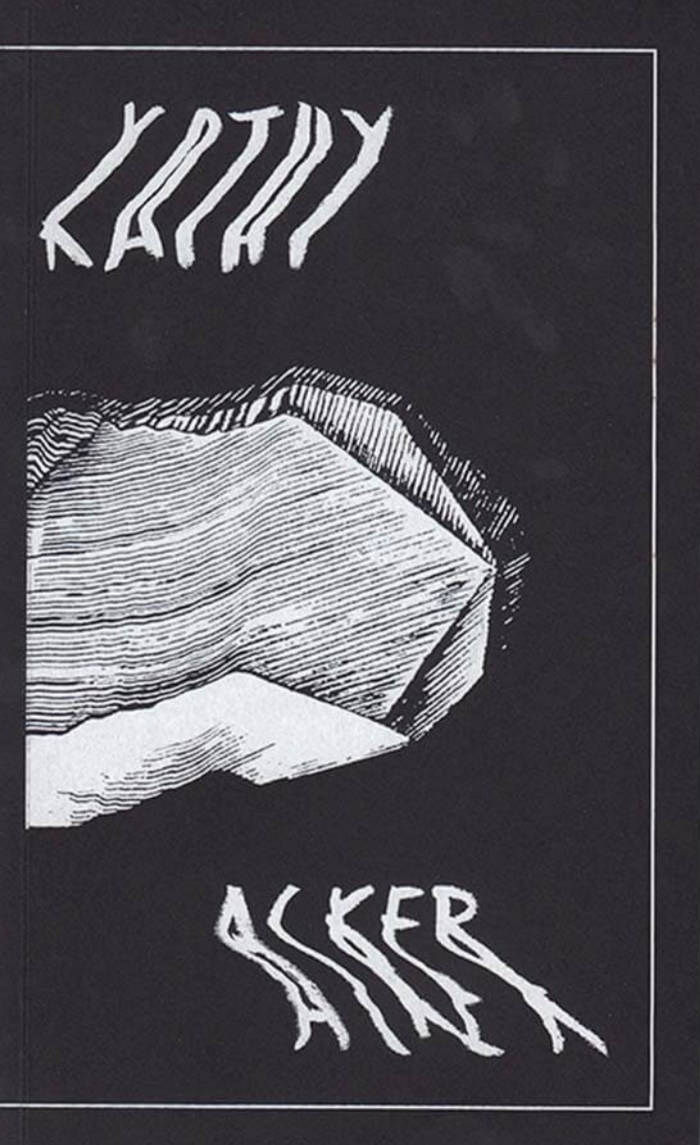
Kathy Acker (1971-1975)
First critical edition of Kathy Acker’s unpublished early writings from (1969-1976). Comprises almost all the typescripts from that period present in the Kathy Acker’s archives. Features also the transcription and presentation of Acker’s two 1974 experimental videos.
Editor: Justin Gajoux. Critical notes: Justin Gajoux & Claire Finch. Also with texts of: Alan Sondheim, Emily Cheng, Jill Kroesen, Peter Gordon, Claire Finch, Anna Maria Pinaka, Matias Viegener, Justin Gajoux.

I Want
I Want reviews the eponymous duo's double-projection film installation examining issues of gender, sexuality and performativity—and inspired by the words of punk poetess Kathy Acker and convicted whistle-blower Chelsea Manning. This publication documents the major film installation I Want (2015) by collaborative artists Pauline Boudry and Renate Lorenz, which was presented at their 2015 solo exhibitions at Kunsthalle Zürich and Nottingham Contemporary.
The double-projection film installation is based on a script that borrows texts from American punk-poet Kathy Acker (1947-1997), as well as chats and materials by convicted whistle-blower Chelsea Manning that speak of her reasons for revealing nearly one million secret military and diplomatic documents through WikiLeaks, at the same time exposing her transgender identity to her superiors.
Through poetic gestures of appropriation and recombination, Boudry and Lorenz examine issues around gender, sexuality, the performance of identity, and the nature of collaboration. Alongside generous color documentation, written contributions by Gregg Bordowitz, Laura Guy, Dean Spade, and Craig Willse unpack and reflect upon both the historical context and contemporary significance of this multivalent work.

Frozen Tears II
Texts By: Kathy Acker, Mireille Andrès, Antonin Artaud, Dominique Auch, Ned Baldwin, Stephen Barber, Georges Bataille, Baudelaire, John Beagles, Mark Beasley, Dodie Bellamy, Alissa Bennett, Simon Bill, Jesse Bransford, R.A.Bransford Jr Esq, Paul Buck, Bonnie Camplin, Aline Bouvy/John Gillis, Dennis Cooper, John Cussans, Trinie Dalton, Sue De Beer, Brock Enright, Felix Ensslin, Dan Fox, Robert Garnett, Paul Green, Matthew Greene, Fernando Guerreiro, Pierre Guyotat, Ilana Halperin, Glen Helfand, Jacques Henric, Rachel Howe, Ben Kaleb Brantley, Seth Kelly, Kevin Killian, Christopher Knowles, Jennifer Krasinski, Cedar Lewisohn, Lorenzo De Los Angeles Iii, Rachel Lowther, Dave Martin, Karl Marx, Casey Mckinney, Gean Moreno, J.P. Munro, Paulina Olowska, Simon O¹Sullivan, Arthur Ou, Damon Packard, Mike Paré, Graham Parker, Wotjek Puslowski, Adam Putnam, Ian Rafael Titus, Eugène Savitzkaya, Eric Schnell, Amy Sillman, Allison Smith, Joanne Tatham/ Tom O'sullivan, Daniel Torop, Genya Turovsky, Banks Violette, Benjamin Weissman, Ivan Witenstein, Thom Wolf

Virus
WHAT TO EXPECT IN THIS BOOK:
* tentacle sex
* Kathy Acker
* the violent deaths of male genius artists, philosophers and theorists
* zombies
* sirens
* biohacking
* rampant plagiarism
* cop killing
* spells you can use at home